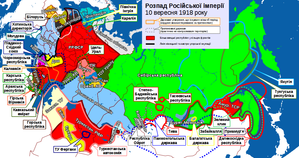Secession in Russia
The possible Dissolution of Russia is a hypothetical disintegration of the Russian Federation as a single state, as well as opinions and analysis of the consequences of this event.[1]
The topic is the subject of hundreds of articles on the Internet.[2]
Russia, like any other country, is experiencing both integration and disintegration processes, and the latter are threatening the collapse of the country. This topic was actively discussed by E. Kholmogorov, G. Kasparov, M. Leontiev, P. Svyatenkov, K. Remchukov, K. Rodionov, A. Eliseev, I. Prokopenko, G. Gref, M. Kalashnikov, M. Remizov, M. Delyagin, A. Fursov, G. Malinetsky, V. Solovey, S. Kurginyan, A. Prokhanov, N. Narochnitskaya, V. Averyanov, V. Tretyakov, I. Yakovenko, D. Medvedev[1].
Historical precedents[edit]


In Russian history, there were two periods during which significant territories fell away from it. The first is the disintegration of the Russian Empire as a result of the February and October revolutions in 1917–1921. Active disintegration processes began in the economy, social structure, public and political spheres of the Russian Empire, which ultimately led to the end of the Tsarist regime and became parts of independent states as Poland, Finland and Romania. The second is the dissolution of the Soviet Union in 1990–1991 which to the independence of the 15 republics of the USSR (Lithuania, Latvia, Estonia, Belarus, Ukraine, Georgia, Armenia, Azerbaijan, Kazakhstan, Kyrgyzstan, Uzbekistan, Turkmenistan and Tajikistan).
In the 1990s, a number of regions wanted to secede from the Russian Federation: the Chechen Wars (with the Chechen Republic of Ichkeria), the attempt to create the Ural Republic, the Republic of Tatarstan, which finally became part of Russia only in the mid-1990s, can also be attributed to the disintegration processes which, nevertheless, managed to be stopped.
Possible causes of decay[edit]
According to mathematician Georgiy Malinetsky,[3] there are some possible reasons for the collapse of Russia:
- the big difference between the income levels of different social strata;
- strong economic gap between different regions of Russia;
- the complexity of communications between different regions of the country, which are the result of infrastructure underdevelopment;
- breakdown of generations;
- strengthening the existing schism in a religious, cultural and national context;
- strengthening the power of local regional leaders;
Opinions on the consequences[edit]
In an interview with the magazine "Expert" in April 2005, the head of the presidential administration, Dmitry Medvedev said[1]:
| “ | If we fail to consolidate the elite, Russia may disappear as a single state. <...> The consequences will be monstrous. The disintegration of the Union may seem like a matinee in the kindergarten compared to the state collapse in modern Russia. | ” |
| — Dmitry Medvedev | ||
In 2011, during a meeting of the government Commission for the development of the North Caucasian Federal District in Gudermes, Vladimir Putin said what would happen if the Caucasus suddenly left Russia[4]:
| “ | If this happens, then, at the same moment-not even an hour, but a second-there will be those who want to do the same with other territorial entities of Russia, <...> and it will be a tragedy that will affect every citizen of Russia without exception. | ” |
| — Vladimir Putin | ||
References[edit]
- ↑ 1.0 1.1 1.2 Философские науки — 2/2015. В. Н. Шевченко. К дискуссиям вокруг темы «Распад России»: В поисках оптимальной формы Российского государстваArchived 2016-09-20 at the Wayback Machine
- ↑ "Распад России в начале XXI века в высказываниях современников". www.polit.nnov.ru. Retrieved 2016-11-11.
- ↑ Беляев, Э. "Действительно ли России близится к распаду, как предсказывают математики?". Ойкумена. Регионоведческие исследования.
- ↑ "Владимир Путин: Отделение Кавказа от России приведет к развалу страны". Российская газета (in русский). 2011-12-20. Retrieved 2018-05-06.
External links[edit]
- Philosophical Sciences — 2/2015. V. Shevchenko. To the discussions around the topic "The Breakup of Russia": in Search of the Optimal Form of the Russian State
- 11.05.2009 Maslov Oleg. The disintegration of Russia at the beginning of the 21st century in the statements of contemporaries
- Is Russia's collapse inevitable?
- Is it possible for Russia to decay or contract?
- http://ecsocman.hse.ru/data/2011/09/04/1267441592/2.pdf
This article "Secession in Russia" is from Wikipedia. The list of its authors can be seen in its historical and/or the page Edithistory:Secession in Russia. Articles copied from Draft Namespace on Wikipedia could be seen on the Draft Namespace of Wikipedia and not main one.
